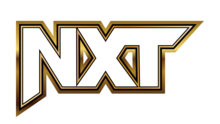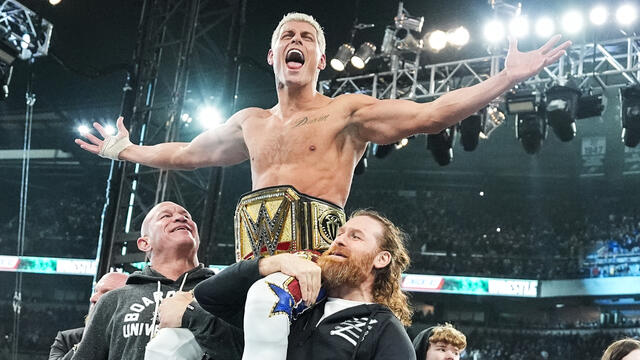
The last of the British masters: The Robbie Brookside story

Four-thousand miles and a transatlantic voyage away from his home of Liverpool, England, Robbie Brookside should look out of place in sunny Orlando, Fla., but the onetime savior of British wrestling is anything but.
Unlike his best friend and fellow countryman William Regal, Brookside never considered wrestling in the United States to be his end game. Perhaps inconceivably, WWE Superstardom never factored into his plans, nor was it something he pursued, which only makes his current role, as a trainer at the WWE Performance Center, all the more fascinating.
As circuitous and unforeseen as his arrival to WWE’s breeding ground may be, ask any NXT Superstar who has worked with him and they’ll all tell you the same thing: Brookside has become an invaluable member of the Performance Center coaching staff since taking up residence in Florida in fall 2013.
Sami Zayn described Brookside’s passion for sports-entertainment as goose-bump-inducing. Enzo Amore said his enthusiasm is contagious. NXT Champion Adrian Neville called his years of experience “priceless” for not only the Performance Center, “but also the future of WWE.”
The admiration for Brookside — a relative unknown to many fans stateside — doesn’t begin and end with the Superstars of tomorrow, either. WWE Hall of Famer Gerald Brisco, who helps recruit collegiate wrestlers into WWE’s developmental system, said the acclaimed trainer entered wrestling the “old-school way,” and likened it to his own experience. “Robbie’s a lot younger than me, but he broke in the same way, fighting from underneath,” Brisco said.
View photos of Robbie Brookside| Sheamus talks Brookside's influence
Once dubbed by a British announcer as the “tall boy from Liverpool,” Brookside clawed his way into wrestling when seemingly everybody was working to prevent that fate. There was the headmaster at his school, where Brookside was a highly touted soccer prospect, who called him a disgrace and revoked his sponsorship when he missed games to watch wrestling across the River Mersey in New Brighton. His father, a former pro with the Preston club who was initially disappointed by his son’s career choice, actively sought to block his entry into wrestling. The veterans of the British locker rooms, perceiving the fresh-faced lad with sandy blond locks as competition to be smothered, tormented Brookside inside the ring and during road trips between port cities, and were fiercely tight-lipped with trade secrets.
Despite the considerable headwinds, Brookside persevered, becoming a pillar of the U.K. wrestling scene in the 1980s and ’90s. Now at least temporarily retired from competition, he sees it as his duty to pass on what he learned to individuals — WWE developmental talent, as the case may be — who are in a similar position to where he was some three decades ago.
“My dad wanted me to lose all the love and attraction I’d had for wrestling, but in hindsight, it was the catalyst for a 33-year career,” Brookside said, recalling his first foray into sports-entertainment, back when he was a teenager. Unbeknownst to Brookside, his father had encouraged a friend of Robbie’s to “put a spanner in the works.” While attending a show at Liverpool Stadium, his friend pointed out the junior Brookside to veteran grappler Carl McGrath and told McGrath that Brookside thought wrestling was fixed. Eager to dispel that notion, McGrath instructed the pal to invite Brookside to a local wrestling club to sit in on a session.
What neither Brookside nor his friend fully realized, but what quickly became very apparent, was that the overture did not come from a place of goodwill. When the rail-thin Brookside arrived, McGrath put three minutes on the gym’s clock and went to work, grinding down the overwhelmed youngster.
“Even now, somewhere deep down in my heart, I can still feel the pain of what I went through,” Brookside told WWE.com. “And I’d never realized I had a neck before because I never had any pain there. He worked a magic little number on me. I threw up, and I had blood trickling down from my nose. I couldn’t breathe. I remember a real panicked feeling inside.”
Against the wishes of his family and friends, Brookside would not be deterred, and he returned to McGrath’s club each week after his pulverizing initiation until the grizzled, cauliflower-eared vets had no choice but to slowly weave him into the business. Brookside started out by helping assemble rings and keeping time for the matches. In October 1981, he finally had his first match, and shortly after, while still a teen, he ventured to Blackpool, where his in-ring career began in earnest under the tutelage of wrestler-turned-promoter Bobby Barron. Much of the old guard, however, remained resentful. Mentorship was hard to come by, and Brookside endured maulings inside the ring. Outside the ropes, he was bullied relentlessly, as old-timers would use car cigarette lighters to burn his track suit or pour WD-40 in his mouth if he fell asleep on the long car rides between shows.
“I went through the front door of this job when it was a closed-door business,” Brookside said. “The main thing was, you weren’t really given a chance and no wanted to help you. Everyone considered you to be taking the bread and butter off their table. You’d enter a dressing room and the old guys would stare at you; it didn’t really breed confidence, and from there, I just wanted to get better.”
Go inside a real WWE tryout at the Performance Center | Learn about WWE's infamous Attitude Era training camp
Inspired by other wrestlers’ tales of competing in Germany, where the pay was good and the talent was top-notch, Brookside eventually found himself touring not only Deutschland but also France, the Middle East and Nigeria. Four years into his career, he befriended William Regal. The two were soon paired together as a team called The Golden Boys, and while competing nightly for British promoter Brian Dixon’s All-Star Wrestling outfit, Brookside and Regal quickly blossomed into ace performers.
“Just being around him, the stuff I was learning and then having to compete against, and team with, someone who was that good made me the wrestler that I became,” Regal said. “Robbie’s really the key influence in me getting the career that I had, because otherwise I wouldn’t have been anywhere near as good as I was, as quickly as I was.”
In time, Brookside grew from a wide-eyed novice into what many pegged as the future of British wrestling, the leader of a new generation of that would be responsible for carrying on the dying tradition of technical grappling. For years, the calling card of wrestlers from the U.K. was their ability to be “plugged in” to any style of wrestling, anywhere in the world. Their unparalleled grasp on the fundamentals and intricacies of mat wrestling was revered, and Brookside led the pack in the ’90s.
Eventually, even the strongest critic of Brookside’s chosen path couldn’t help but acknowledge his mastery. Three months before he passed away, Brookside’s father saw his son wrestle live for the first time in Liverpool. After the show, Brookside met his father in a nearby veterans’ club and asked him what he thought.
Keep reading: Sami Zayn on Brookside: "He’s a ‘Why?’ guy, not a ‘How?’ guy"
“I was really nervous,” Brookside said. “He just went, ‘You’re quick, aren’t you?’ My father never told me to my face, but his friends used to say he was really proud of me because I took my own course and it wasn’t an easy course to plot or to chart. That, to me, is really a success.”
Brookside’s maturation, however, coincided with changing winds in the sports-entertainment world. As he entered his in-ring prime, the focus in wrestling shifted from regional promotions to the juggernauts in North America — WWE and WCW, primarily — which offered a style far different than what was once featured on England’s famed “World of Sport” television show. By the ’90s, Britain’s indigenous style was fading fast. Much of the country’s prized homegrown talent, such as Regal, saw America as the ultimate destination. Nevertheless, Brookside stayed true to his roots.
“Brookside was the finest ambassador British wrestling could hope for, and seldom missed an opportunity to talk up his profession,” author Simon Garfield wrote in his 1996 homage to British grappling, “The Wrestling.” “[Brookside] gave interviews to local papers and local radio wherever he went, pleading for a bit of investment to revive his devastated world.”
Nowadays, Brookside gets irked when the techniques he holds so dear are termed “old school.” To him, it’s wrestling, plain and simple, and it’s something he is religiously fighting to keep alive.
“In that book, ‘The Wrestling,’ I tried to stay up on a bit of driftwood and shout for someone to please come and help us,” he said. “But, by that time, we’d started looking across the Atlantic.”
Brookside never did become a star in the U.S. He had a cup of coffee in WCW during its zenith in the mid-’90s, at time when the organization’s roster was famously bloated. Sticking out was nearly impossible, especially as Brookside’s talents were relegated to short matches on WCW’s third-string weekend programming. Brookside does not recall the experience favorably.
Can you name these WCW wrestlers? | Watch 'No Heroes Here': Three days at a WWE tryout
Through it all, however, he maintained his friendship with Regal, who was all too aware of the knowledge that Brookside could impart to younger wrestlers. Years later, when WWE had installed a developmental territory in Memphis, Tenn., Regal called upon his mate to lend a hand. It was there that Brookside informally began passing along the traditions of British wrestling to WWE developmental talent.
“We used to get Daniel Bryan, Spanky [Brian Kendrick] and Reckless Youth in one ring and just teach them how to wrestle — proper wrestling,” Brookside said. “Not punching someone, but rather taking someone down, applying a hold or giving them an uppercut. Strikes to the back and stomach, kick the leg and then put a toe or ankle lock on it.”
Despite all the hardships he was dealt by veterans early in his career — or maybe because of those difficulties — Brookside felt it his duty to assist those who wanted to learn. The process helped set in motion the work he continues today at the WWE Performance Center.
Teaching always came naturally to him. Even dating back to his time in All-Star Wrestling in the ’80s, Brookside would be tapped to go in the ring and work out with talent that was new to the area. Unlike those who preceded him, Brookside was eager to share what he knew. “Because I didn’t really get helped out by the majority, whenever someone came with lesser ability, I always wanted to help him,” Brookside said.
Among those whose Brookside tutored in the U.K. were Sheamus, Bad News Barrett and retired independent wrestling star Nigel McGuinness. Recognizing his eye for talent and his skills as a trainer, WWE invited Brookside to Florida in 2013 to assist with WWE’s developmental program on a short-term basis. More than a year later, Brookside is a full-time member of the Performance Center staff, and he’s the first instructor newcomers train under upon entering the facility.
“It’s the nearest I’ve ever had to an office job, making reports and getting my hair cut and opening a Twitter account,” Brookside said. “The fact I’ve got my own class here, and it’s the first class through the doors, it’s my job to keep it basic. I don’t go into great detail about wrestling; it’s not my job to do that, other coaches have their own directions. Every coach here has their own specialty. It’s like having a big kitchen and everyone can cook their own style of food.”
Keeping with that analogy, Brookside may teach Introductory Knife Skills, but that doesn’t mean he lacks opportunity to show off his knowledge of molecular gastronomy. Ironically, it might be in Orlando where Brookside is best able to keep British wrestling alive.
“Robbie brings a whole different aspect,” said Corey Graves. “That British style that he excels in is different, but just his understanding of wrestling and the way he’s able to break things down, theory-wise, is unbelievable. He can show you how to do a basic headlock, or he can show you some insane reversal to the headlock that you never even thought existed. He can literally do anything in-between the ropes.”
For Brookside’s fellow countryman Adrian Neville, it is imperative that the British traditions outlast the self-sustainability of England’s wrestling scene. The Superstar from Newcastle upon Tyne is glad that impressive style has a conduit in Brookside. “He has such experience in that style that, maybe, is in its dying years, at the moment,” Neville said. “The fact he can influence the younger generation and educate them on that style, which really deserves a larger platform, is priceless.”
Yet, Brookside’s instruction pays dividends well beyond that. Upon returning to the Performance Center after blowing out his knee in 2012, Sami Zayn was inserted in its beginner’s class to ease his transition back into the ring. Even though Zayn had 12 years’ experience by that point, there was still plenty for him to learn under Brookside.
“He stresses passion and feeling everything you do like no other coach we have in there,” Zayn said with a sense of astonishment. “He’s a ‘Why?’ guy, not a ‘How?’ guy. He emphasizes full emotion, full intensity and full belief in what you’re doing. I can’t stress enough I think everybody should be trained in that regard.”
Superstars’ glowing accounts of Brookside-as-trainer give the sense that his passion for wrestling is inspirational. Just being in the ring with Brookside “and seeing how much he cares brings more out of you,” said Bo Dallas.
Leave it to Brookside’s friend Regal to perhaps best crystallize the benefit of having Brookside on staff in Florida, calling him a “true joy to be around.”
“That’s the one thing, more than anything else,” Regal said. “He’s patient. He’ll listen. He’ll help. He’ll give you the right amount of encouragement when you need it. He’ll tell you off when you need it, but he’ll tell you why. A lot of people can just bark orders, but they’re just barking orders. There’s a big difference between that and being a true teacher, and Robbie’s an exceptional teacher of professional wrestling.”
WWE Shows Latest Results
Raw results, April 15, 2024: Chad Gable viciously attacks Sami Zayn after losing to Zayn in Intercontinental Title Match!
Full ResultsSmackDown results, April 12, 2024: LA Knight and AJ Styles earn victories for a chance to challenge Cody Rhodes at WWE Backlash!
Full ResultsWWE NXT results, April 16, 2024: Trick Williams defeats Carmelo Hayes in a Steel Cage Match
Full Results















